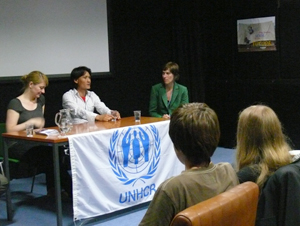 They're alive. Because they fled. They are teenagers who fled crisis regions and undertook an extremely dangerous journey to Europe, all alone, hoping for one thing: to live. After arriving in Austria, they fight to live normal lives, struggling against a system that demands they sacrifice their youth to an uncertain future. The moving, insightful and at times humourous documentary "Little Alien" by Nina Kusturica follows the fates of several teenage refugees on their flight from their countries of origin - climbing fences, hiding in trucks, dodging border guards - to Austria.
They're alive. Because they fled. They are teenagers who fled crisis regions and undertook an extremely dangerous journey to Europe, all alone, hoping for one thing: to live. After arriving in Austria, they fight to live normal lives, struggling against a system that demands they sacrifice their youth to an uncertain future. The moving, insightful and at times humourous documentary "Little Alien" by Nina Kusturica follows the fates of several teenage refugees on their flight from their countries of origin - climbing fences, hiding in trucks, dodging border guards - to Austria.
To mark World Refugee Day on 20 June, UNIS Vienna and the United Nations High Commissioner for Refugees (UNHCR) Office in Austria held a screening of "Little Alien" at United Nations headquarters in Vienna, followed by a discussion with the director Nina Kusturica; Jawid, a young Afghan who now lives in Austria and is one of the protagonists of the film; and Birgit Einzenberger of the UNHCR Office in Austria. The discussion was moderated by Maher Nasser, Director, UNIS Vienna.
In the discussion, which was attended by United Nations staff and visitors including a school class, Jawid answered the audience's questions on why he had travelled so far to Austria without his family and spoke about his experiences - good and bad - in dealing with his situation and struggling to reconquer his future. Nina Kusturica explained how she had decided on the name "Little Alien", reflecting both the bureaucratic terminology of institutions but also the feeling of the protagonists of the film that they were outsiders because of their refugee status.
At the end of 2009 there were 10.4 million refugees around the world (not counting 4.8 million Palestinian refugees, who are helped by the UN organization UNRWA) and 27.1 million internally displaced persons (IDPs), people who have been driven from their homes by conflicts or persecution, with UNHCR currently providing protection or assistance to 15.6 million of them. This compares to 10.5 million refugees and 26 million IDPs, with a share of 14.4 million IDPs who received protection or assistance from UNHCR at the end of 2008.
"More than 18,700 asylum applications were lodged by unaccompanied and separated children in 71 countries, the highest number in four years, according to the 2009 Global Trends Report by UNHCR, released on 15 June. The applications came mostly from Afghan and Somali children, and the majority are boys aged between 15 and 17," said Birgit Einzenberger of UNHCR Austria.
The Office of the United Nations High Commissioner for Refugees (UNHCR) was established on 14 December 1950 by the United Nations General Assembly. The agency is mandated to lead and coordinate international action to protect refugees and find durable solutions for them worldwide. Its primary purpose is to safeguard the rights and well-being of refugees. UNHCR strives to ensure that everyone can exercise the right to seek asylum, to find safe refuge and to integrate in another State. If neither local integration nor voluntary return provide for a durable solution, the UN Refugee Agency facilitates the resettlement of refugees in a third country.
Born in Mostar, Bosnia-Herzegovina, in 1975, the Director Nina Kusturica grew up in Sarajevo in a family of artists. Since 1992 - the beginning of the war in Bosnia-Herzegovina - she has lived in Vienna and now works as a director, editor, writer and producer, and also teaches at the University of Vienna.
For further information on "Little Alien" visit:
www.littlealien.at